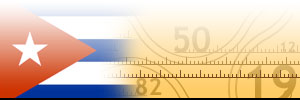| CATEGORIES | TV | RADIO | COMMUNICATE | WHEREILIVE | INDEX | SEARCH | |||||||
|
| You are in:World: Americas | ||||||||||||||||||||||||||||||||||||||||||||||||||||||||||||||||||||||||||||||||||||||||||||||||||||||||||||||||||||||||||||||||||||||||||||||||||||||||||||||||||||||||||||||||||||||||||||||||||||
|
Saturday, 27 July, 2002, 14:04 GMT 15:04 UK
Timeline: Cuba

A chronology of key events
1492 - Christopher Columbus visits Cuba and claims it for Spain.
1526 - Importing of slaves from Africa begins. 1762 - Havana captured by a British force led by Admiral George Pocock and Lord Albemarle. 1763 - Havana returned to Spain by the Treaty of Paris. Wars of independence
1886 - Slavery abolished. 1895-98 - Jose Marti leads a second war of independence; US declares war on Spain. 1898 - US defeats Spain, which gives up all claims to Cuba and cedes it to the US. US tutelage 1902 - Cuba becomes independent with Tomas Estrada Palma as its president; however, the Platt Amendment keeps the island under US protection and gives the US the right to intervene in Cuban affairs.
1906-09 - Estrada resigns and the US occupies Cuba following a rebellion led by Jose Miguel Gomez.
1909 - Jose Miguel Gomez becomes president following elections supervised by the US, but is soon tarred by corruption. 1912 - US forces return to Cuba to help put down black protests against discrimination. 1924 - Gerado Machado institutes vigorous measures, forwarding mining, agriculture and public works, but subsequently establishing a brutal dictatorship. 1925 - Socialist Party founded, forming the basis of the Communist Party. 1933 - Machado overthrown in a coup led by Sergeant Fulgencio Batista. 1934 - The US abandons its right to intervene in Cuba's internal affairs, revises Cuba's sugar quota and changes tariffs to favour Cuba. 1944 - Batista retires and is succeeded by the civilian Ramon Gray San Martin.
1953 - Fidel Castro leads an unsuccessful revolt against the Batista regime. 1956 - Castro lands in eastern Cuba from Mexico and takes to the Sierra Maestra mountains where, aided by Ernesto "Che" Guevara, he wages a guerrilla war. 1958 - The US withdraws military aid to Batista. Triumph of the revolution 1959 - Castro leads a 9,000-strong guerrilla army into Havana, forcing Batista to flee. Castro becomes prime minister, his brother, Raul, becomes his deputy and Guevara becomes third in command. 1960 - All US businesses in Cuba are nationalised without compensation; US breaks off diplomatic relations with Havana.
1962 - Cuban missile crisis ignites when, fearing a US invasion, Castro agrees to allow the USSR to deploy nuclear missiles on the island. The crisis was subsequently resolved when the USSR agreed to remove the missiles in return for the withdrawal of US nuclear missiles from Turkey. 1965 - Cuba's sole political party renamed the Cuban Communist Party. 1972 - Cuba becomes a full member of the Soviet-based Council for Mutual Economic Assistance. Interventions in Africa 1976 - Cuban Communist Party approves a new socialist constitution; Castro elected president.
1980 - Around 125,000 Cubans, many of them released convicts, flee to the US. 1982 - Cuba, together with other Latin American states, gives Argentina moral support in its dispute with Britain over the Falkland islands. 1988 - Cuba agrees to withdraw its troops from Angola following an agreement with South Africa. Surviving without the USSR 1991 - Soviet military advisers leave Cuba following the collapse of the USSR.
1994 - Cuba signs an agreement with the US according to which the US agrees to admit 20,000 Cubans a year in return for Cuba halting the exodus of refugees. 1996 - US trade embargo made permanent in response to Cuba's shooting down of two US aircraft operated by Miami-based Cuban exiles. 1998 - Pope John Paul II visits Cuba. 1998 - The US eases restrictions on the sending of money to relatives by Cuban Americans.
2000 June - Elian allowed to rejoin his father in Cuba after prolonged court battles. 2000 October - The US House of Representatives approves a measure allowing the sale of food and medicines to Cuba. 2000 December - Russian President Vladimir Putin visits Cuba and signs accords aimed at boosting bilateral ties. 2001 October - Cuba angrily criticises Russia's decision to shut down the the Lourdes radio-electronic centre on the island, saying President Putin took the decision as "a special gift" to US President George W. Bush ahead of a meeting between the two men.
2001 November - The United States exports food to Cuba for the first time in more than 40 years following a request from the Cuban government to help it cope with the devastation caused by Hurricane Michelle. 2002 January - Prisoners taken during US-led action in Afghanistan are flown into Guantanamo Bay for interrogation as al-Qaeda suspects. 2002 January - Russia's last military base in Cuba, at Lourdes, closes down. 2002 April - Diplomatic crisis after UN Human Rights Commission again criticises Cuba's rights record. This time the resolution is sponsored by Uruguay and supported by many of Cuba's former allies including Mexico. Uruguay breaks off ties with Cuba, after Castro says it is a US lackey. Castro accuses Mexico's President Fox of lying and forcing him to leave a UN conference in Mexico in March so that he wouldn't cross paths with US President George Bush. 2002 May - US Under Secretary of State John Bolton accuses Cuba of trying to develop biological weapons, adding the country to Washington's list of "axis of evil" countries.
2002 June - The National Assembly amends the country's constitution to make Cuba's socialist system of government permanent and untouchable. Castro had called for the assembly vote in response to criticisms from US President George W Bush.
|
Top Americas stories now:
Links to more Americas stories are at the foot of the page.
|
||||||||||||||||||||||||||||||||||||||||||||||||||||||||||||||||||||||||||||||||||||||||||||||||||||||||||||||||||||||||||||||||||||||||||||||||||||||||||||||||||||||||||||||||||||||||||||||||||
|
Links to more Americas stories |
 |
||
| ----------------------------------------------------------------------------------
To BBC Sport>> | To BBC Weather>> | To BBC World Service>> ---------------------------------------------------------------------------------- MMIII | News Sources | Privacy |